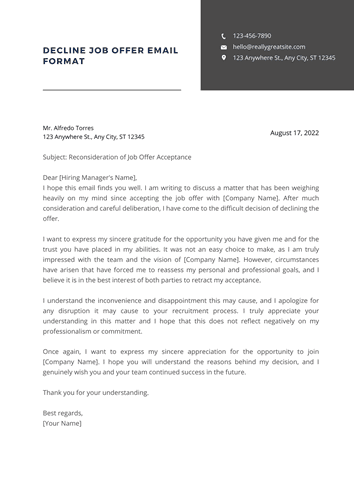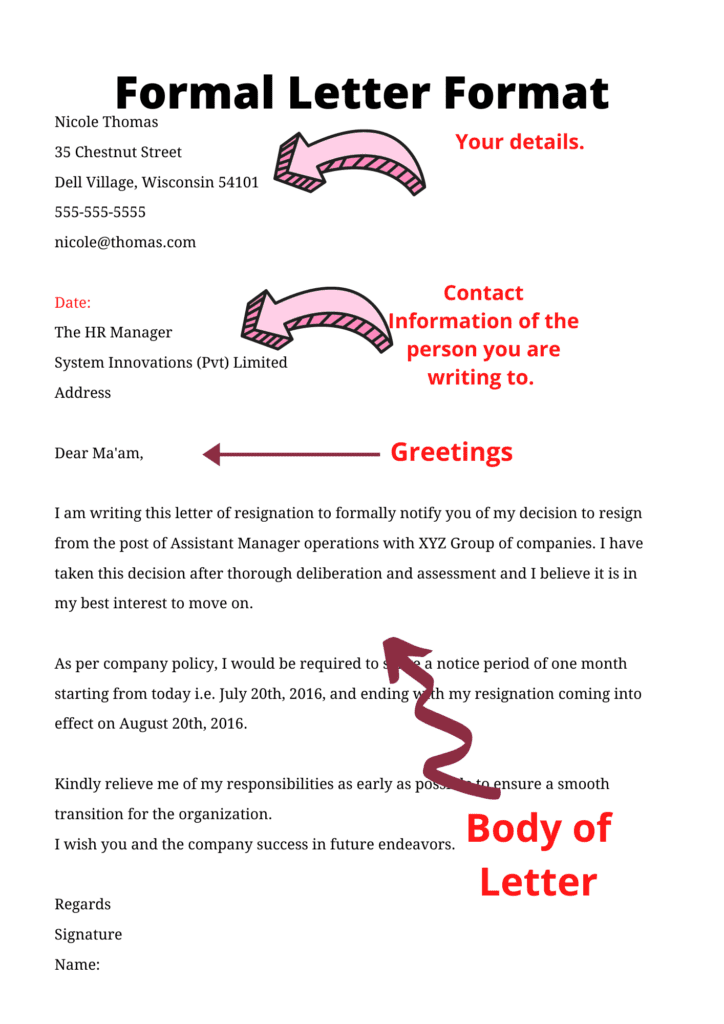How to Decline a Job Offer You Already Accepted: Understanding the Situation
In today’s competitive job market, receiving a job offer is an exciting achievement. However, circumstances can change, and sometimes you may find yourself needing to decline a job offer that you have already accepted. While this situation can be challenging and potentially uncomfortable, it’s essential to handle it with professionalism and tact. In this article, we will explore effective strategies on how to decline a job offer you already accepted, ensuring that you maintain positive relationships and preserve your professional reputation.
Before diving into the specific steps of declining a job offer you already accepted, it’s crucial to understand the gravity of the situation. Accepting a job offer is a commitment, and retracting your acceptance can have consequences. However, unforeseen circumstances may arise, making it necessary to decline the offer. Let’s explore the steps involved in this delicate process.
Step 1: Self-Reflection and Decision-Making
Assess Your Reasons for Declining
Before taking any action, it’s essential to reflect on your reasons for declining the job offer. Ask yourself why you have changed your mind and evaluate whether it’s a valid and justifiable decision. Some common reasons for declining a job offer include receiving a more favorable offer, personal circumstances, or realizing that the role isn’t aligned with your long-term career goals.
Weigh the Pros and Cons
Consider the potential impact of declining the job offer on your professional reputation and future career prospects. Weigh the pros and cons of accepting the offer versus the consequences of declining it. Carefully evaluate the potential benefits and drawbacks before making a final decision.
Step 2: Prompt Communication
Notify the Employer Immediately
Once you have made your decision, it’s crucial to inform the employer promptly. The longer you delay, the more inconvenient it becomes for the employer to make alternative arrangements. Reach out to the hiring manager or the designated contact person via phone or email, expressing your gratitude for the opportunity and explaining your change in circumstances.
Be Honest and Professional
When communicating your decision, be honest and straightforward. Clearly articulate your reasons for declining the job offer without being overly detailed or negative. Maintain a professional and respectful tone throughout the conversation or email exchange.
Step 3: Offer Alternative Solutions
Express Your Regret
Show empathy and understanding towards the employer by expressing your regret for any inconvenience caused. Assure them that you genuinely appreciate the offer and the time invested in the recruitment process. This displays your professionalism and maintains a positive impression, even in the face of declining the offer.
Suggest Possible Replacements
If possible, offer assistance in finding a suitable replacement for the position. Recommend potential candidates or express your willingness to help with the transition process. This proactive approach demonstrates your commitment to the employer’s success and reinforces your professionalism.
How to reject a job offer politely email sample

Email Sample 1: decline job offer email format
Subject: Reconsideration of Job Offer Acceptance
Dear [Hiring Manager’s Name],
I hope this email finds you well. I am writing to discuss a matter that has been weighing heavily on my mind since accepting the job offer with [Company Name]. After much consideration and careful deliberation, I have come to the difficult decision of declining the offer.
I want to express my sincere gratitude for the opportunity you have given me and for the trust you have placed in my abilities. It was not an easy choice to make, as I am truly impressed with the team and the vision of [Company Name]. However, circumstances have arisen that have forced me to reassess my personal and professional goals, and I believe it is in the best interest of both parties to retract my acceptance.
I understand the inconvenience and disappointment this may cause, and I apologize for any disruption it may cause to your recruitment process. I truly appreciate your understanding in this matter and I hope that this does not reflect negatively on my professionalism or commitment.
Once again, I want to express my sincere appreciation for the opportunity to join [Company Name]. I hope you will understand the reasons behind my decision, and I genuinely wish you and your team continued success in the future.
Thank you for your understanding.
Best regards,
[Your Name]
Email Sample 2: declining a job offer email Sample
Subject: Regretful Withdrawal of Job Acceptance
Dear [Hiring Manager’s Name],
I hope this email finds you well. I am writing to inform you that I have made the difficult decision to decline the job offer I previously accepted with [Company Name]. This decision did not come easily, as I was genuinely excited about the prospect of joining your esteemed organization.
However, unforeseen personal circumstances have arisen that have made it impractical for me to proceed with the position at this time. As much as I would have loved to be a part of [Company Name], I must prioritize my personal responsibilities and make the best decision for my current situation.
I want to extend my sincere apologies for any inconvenience or disruption this may cause to your plans. I understand the time and effort that has been invested in the hiring process, and I genuinely regret any inconvenience my decision may have caused. I hope you can appreciate the sincerity of my situation.
I want to express my gratitude for the opportunity you presented to me, and for the positive interactions I have had with the team. I have no doubt that [Company Name] will continue to thrive and achieve great success. I hope that our paths may cross again in the future under different circumstances.
Thank you for your understanding and support.
Best regards,
[Your Name]
Email Sample 3:
Subject: Reconsideration of Employment Acceptance
Dear [Hiring Manager’s Name],
I hope this email finds you well. I am reaching out with a heavy heart to inform you that I have had to reevaluate my decision to accept the job offer from [Company Name]. Since our initial discussions and subsequent acceptance, I have encountered unforeseen changes that have significantly impacted my personal circumstances.
I want to express my sincerest apologies for any inconvenience this may cause and for the trust you had placed in me. I understand the impact this may have on your hiring process, and I genuinely regret any disruption caused. Please know that this decision has not been made lightly, and I have given it extensive thought and consideration.
I want to emphasize my utmost respect for [Company Name] and the opportunity you provided me. It is with deep regret that I must decline the offer, as the current circumstances prevent me from fulfilling the commitment I had initially intended. I genuinely hope you can understand and empathize with my situation.
I would like to extend my gratitude to you and your team for your time, effort, and patience throughout the recruitment process. I have been thoroughly impressed with the professionalism and warmth demonstrated by everyone I interacted with. I wish you and the entire team continued success and growth in the future.
Thank you for your understanding.
Sincerely,
[Your Name]
FAQs About Declining a Job Offer You Already Accepted
Q: Can I decline a job offer after signing the employment contract?
- A: While it is not ideal, it is possible to decline a job offer after signing the employment contract. However, be aware that this may have legal and professional ramifications. Consult with an employment lawyer and follow the contract’s terms and conditions to minimize any potential consequences.
Q: Should I provide a detailed explanation for declining the job offer?
- A: While it’s important to be honest, you don’t need to provide an overly detailed explanation. Focus on the key reasons without criticizing or disparaging the employer or the organization.
Q: Will declining a job offer burn bridges with the employer?
- A: While declining a job offer can be disappointing for the employer, handling the situation professionally and respectfully can minimize any negative impact. Maintaining open communicatio09o0qwsazdxz n and expressing gratitude for the opportunity can help preserve your relations hip.
Q: Can I change my mind and accept the job offer again after declining it?
- A: In some cases, an employer may be open to reconsidering your candidacy if circumstances change. However, this depends on the employer’s discretion and the specific circumstances surrounding your initial decline. Approach the situation with humility and honesty if you decide to explore this option.
Q: How can I decline a job offer without damaging my professional reputation?
- A: The key to declining a job offer without damaging your professional reputation is through open and honest communication. Express your gratitude, provide a valid reason, and maintain a respectful tone throughout the process.
Q: Can I negotiate with the employer after declining the job offer?
- A: While it may be possible to negotiate aspects of the job offer after initially declining, keep in mind that the employer is not obligated to entertain negotiations. Approach this situation with caution and sensitivity, ensuring that your intentions are clear and respectful.
Conclusion
In the ever-evolving landscape of the job market, circumstances may arise that require you to decline a job offer you already accepted. By following the steps outlined in this guide, you can navigate this challenging situation with professionalism and integrity. Remember to communicate promptly, honestly, and respectfully to preserve relationships and maintain your professional reputation. Declining a job offer is never an easy decision, but by handling it gracefully, you can ensure a positive outcome for all parties involved.



